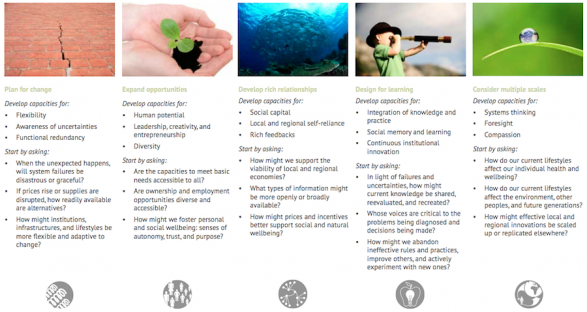“Every noun obscures a verb,” quips Ray Ison in the book, Systems Practice: How to Act in a Climate Change World.
None more so, I would add, than sustainability.
We know sustainability abstractly, like in the Brundtland definition of meeting cross-generational needs, or like in the economy-ecology-equity balancing diagram. Sustainability is often engaged as a set of guidelines for the stuff we produce or build or make. Think 350 or LEED or cradle-to-cradle. As important as these types of visions and guidelines are, this version of sustainability is not a living, breathing thing. It’s a noun, not a verb.
How about if we thought of sustaining as a process? What if we described it in terms of functioning: ways of being and acting that contribute to personal, social, and natural flourishing?
The lingo of functioning comes from the writings of Amartya Sen on the capabilities approach to human development. A similar approach appears in writings on psychological resilience that describe it — not as a trait that one is born with, but — as a competence or capacity to be developed, within social and environmental contexts. (See for example: Ungar, M. 2008. “Resilience across cultures.”)
A sense of personal agency is critical. Capacity development emerges from the interaction of individual agency with social and environmental contexts, whether we are talking about human development and psychological resilience, which are understood at individual scales, or sustainability and (social-ecological) resilience, which are largely understood at community or system scales.
Here are two examples of frameworks for sustainability and resilience that attempt to better account for individual functioning and agency.
For sustainability, from a 2011 paper by Arnim Wiek, Lauren Withycombe, and Charles Redman (“Key competencies in sustainability: a reference framework for academic program development”), which lists five key competencies: systems-thinking, anticipatory, normative, strategic, and interpersonal.
Systems-thinking competence is the ability to collectively analyze complex systems across different domains (society, environment, economy, etc.) and across different scales (local to global), thereby considering cascading effects, inertia, feedback loops and other systemic features related to sustainability issues and sustainability problem-solving frameworks.
Anticipatory competence is the ability to collectively analyze, evaluate, and craft rich ‘‘pictures’’ of the future related to sustainability issues and sustainability problem-solving frameworks.
Normative competence is the ability to collectively map, specify, apply, reconcile, and negotiate sustainability values, principles, goals, and targets.
Strategic competence is the ability to collectively design and implement interventions, transitions, and transformative governance strategies toward sustainability.
Interpersonal competence is the ability to motivate, enable, and facilitate collaborative and participatory sustainability research and problem solving.
For resilience, a piece from a 2012 publication I developed with my colleagues at Ecotrust, “Resilience & Transformation: A Regional Approach” (pdf), in which we described five bundles of capacities (full-sized image):

Your thoughts?
See also:

